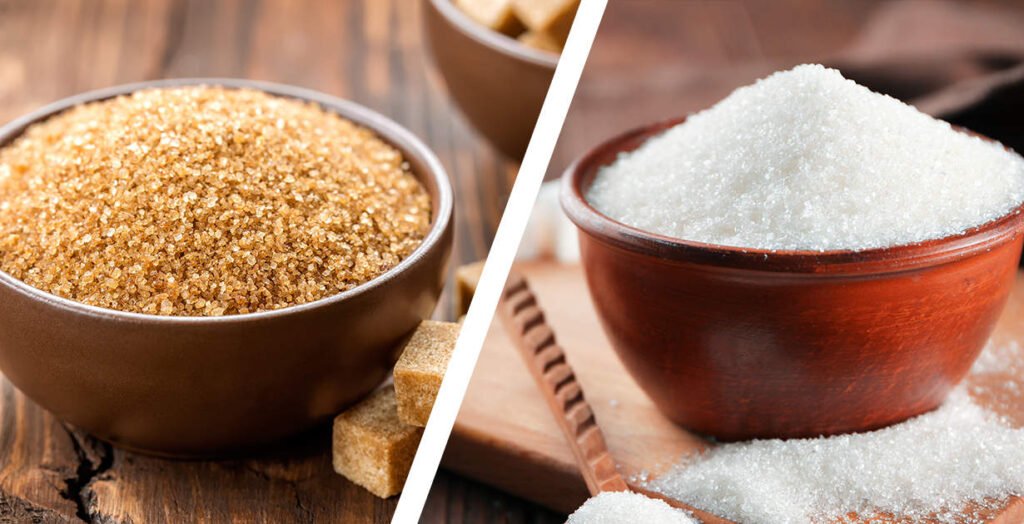Sugar plays a huge role in our diets, whether it’s in our coffee, desserts, or everyday recipes. Among the most common types are brown sugar and white sugar, but many wonder which one is better for their health. In this article, we’ll break down the differences between brown sugar vs white sugar, and explore their impact on your well-being.
What is Brown Sugar?
Brown sugar is essentially white sugar mixed with molasses, which gives it its distinct brown color and slightly richer flavor. The presence of molasses also gives brown sugar a trace amount of minerals like calcium, potassium, iron, and magnesium. However, the amount is so minimal that it doesn’t make a significant difference to your overall nutrient intake.
What is White Sugar?
White sugar, or granulated sugar, is the most refined form of sugar. It’s produced from either sugarcane or sugar beets. During the refining process, molasses is completely removed, leaving behind pure sucrose. This is the most common type of sugar used in households for baking and sweetening beverages.
Nutritional Comparison: Brown Sugar vs White Sugar
When comparing brown sugar vs white sugar, many people believe brown sugar is the healthier option. However, the truth is that both types of sugar are nutritionally similar. Here’s a quick look:
- Calories: Brown sugar has slightly fewer calories than white sugar. One teaspoon of brown sugar has about 15 calories, while white sugar has about 16. This difference is negligible unless you consume large amounts.
- Minerals: Brown sugar contains a small amount of minerals thanks to the molasses, but the difference is so small that it doesn’t offer any significant health benefit over white sugar.
- Glycemic Index: Both brown and white sugar have similar glycemic indexes, meaning they affect blood sugar levels in the same way.
Health Impacts of Sugar Consumption
Regardless of whether you choose brown sugar or white sugar, excessive consumption of any type of sugar can lead to several health problems, including:
- Weight Gain: Both types of sugar provide “empty calories,” meaning they offer no nutritional value while contributing to increased calorie intake, which can lead to weight gain.
- Increased Risk of Diabetes: Excessive sugar consumption has been linked to insulin resistance and a higher risk of developing type 2 diabetes.
- Tooth Decay: Sugar promotes the growth of bacteria in the mouth, which can lead to tooth decay and cavities.
- Heart Disease: Diets high in sugar have been associated with a greater risk of heart disease, as sugar can increase blood pressure and promote inflammation.
Brown Sugar vs White Sugar: Which is Best for Baking?
In baking, the choice between brown sugar and white sugar often comes down to texture and flavour. Brown sugar tends to be softer and adds a slight caramel flavour to baked goods. It’s great for recipes like cookies, cakes, and sauces where moisture and a richer taste are desired.
On the other hand, white sugar provides more sweetness and a crisper texture, making it ideal for meringues, pie crusts, and sweetening beverages without altering the flavour.
Are There Healthier Sugar Alternatives?
If you’re concerned about the health effects of sugar, there are several natural and artificial sweeteners that can be used as substitutes:
- Honey: A natural sweetener that contains antioxidants and nutrients but is still calorie-dense.
- Stevia: A plant-based sweetener with zero calories that won’t spike blood sugar levels.
- Coconut Sugar: Contains a small amount of nutrients and has a lower glycemic index than regular sugar.
Conclusion: Brown Sugar vs White Sugar – Which Should You Choose?
When it comes to brown sugar vs white sugar, the differences are minor in terms of health benefits. Both should be consumed in moderation. If you’re looking for a flavour boost in your cooking or baking, brown sugar may be the better choice due to its molasses content and caramel-like taste. However, for those concerned about calorie or sugar intake, it’s more important to reduce overall sugar consumption, regardless of type.
In the end, neither brown sugar nor white sugar offers significant health benefits, but balancing your sugar intake can contribute to a healthier diet.

